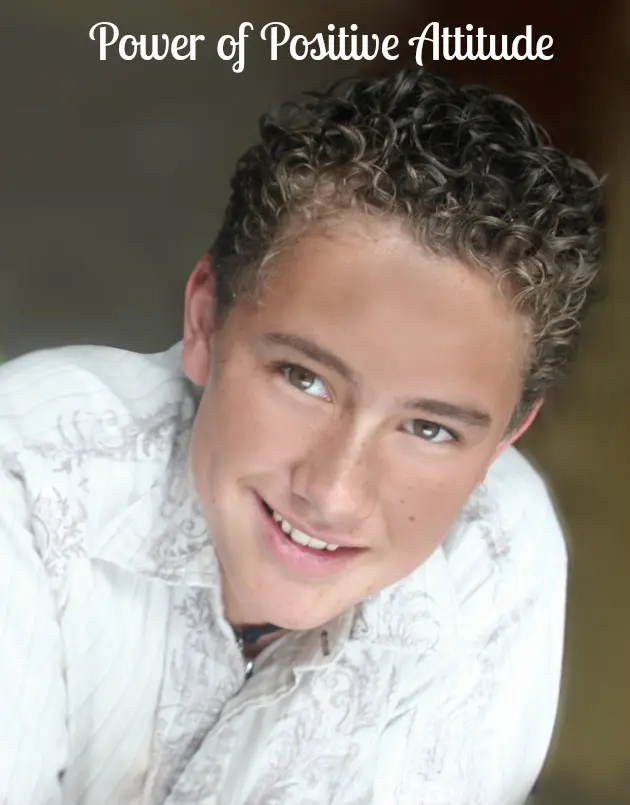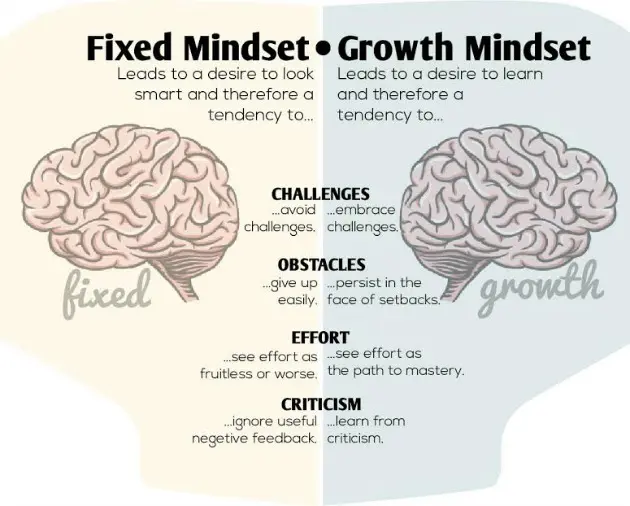I am a big believer in the power of a positive mental attitude. I know from personal experience that dealing with people that see the glass as half full, instead of half empty, is way more fun and way less draining. A positive mental attitude in others is part of what attracts us to them. Whether in a business setting or a family setting, positivity is a force that builds while negativity is a force that destroys. Today, I’d like to first answer, “What is a positive attitude?” and ” Why is positive attitude important?” Then I’d like to talk about how to develop positive attitude in life. These tips for how to have a more positive attitude are useful for ourselves and our children. Finally, I’d like to address how to have positive attitude even in the face of adversity.
What Is A Positive Attitude?
A positive attitude is really a mental mindset that finds the positive aspects of situations and life itself. This does not mean you can never have negative thoughts. It simply means that you do not choose to focus on negative thinking and project a negative outlook on each new experience. A synonym for a positive attitude could an optimistic attitude. Another word for positive attitude could be enthusiasm. These are closely aligned and yet I would suggest that they are slightly different. Although positive people will often be optimistic and enthusiastic, the more defining aspect is that they make the best of the hand they are dealt by finding the positives in any situation. They exhibit positive self-talk in their personal life and project positive energy to those around them. When you walk into the room, do people feel like a storm cloud is approaching or like the sun is coming out?
Why Is Positive Attitude Important For Success? The Benefits Of Having A Good Attitude
Is a positive attitude necessary for success? It sure helps! We hear so much about having a positive attitude. Books and talk show hosts keep telling you to focus on the positive. But is a positive attitude really that important?
The short answer is YES!! A positive attitude can have a profound effect on your life. Let’s take a look at some of the health benefits of positive thinking:
- People with a positive attitude live longer. According to VeryWellMind, “A 2019 study found that positive thinking can result in an 11–15% longer lifespan…”
- Positive thinkers experience lower levels of depression. According to WebMD, “studies have shown that positive thinking helps people manage illness and eases depression…”
- A positive mindset can help strengthen the immune system. According to ClevelandClinic, “positive thoughts reduce stress and inflammation and increase resilience to infection — while negative emotions can make you more susceptible to the common cold and flu.
- A positive attitude also gives you better coping skills to deal with stress and hard times. It also reduces your risk of cardiovascular disease and reduces your risk of death from it. According to Harvard Health, “Many studies show that people prone to negative emotions have a higher risk of heart disease… Basically, those who tend to look for the bright side of negative situations can avoid the damage that stress inflicts on the cardiovascular system.”
In addition to physical health, a positive attitude can also benefit your mental health and wellbeing.
- A positive attitude builds self-esteem
- Increases motivation
- And increases personal happiness
From looking at these benefits, the importance of a positive attitude is clear. If you want to live longer, be healthier, happier, and more motivated to reach your goals, you need the power a positive attitude.

How To Develop Positive Attitude In Life
There are so many benefits of having a positive attitude. The question is then becomes more about how to develop positive attitude in life. These tips to improve positive thinking will help you build your positive attitude quickly and easily. However, it is not a few changes and you are done. Rather, it is a habit that you need to build and continue to work on in your daily life. Here is how to have a good attitude and become a more positive person.
Practice Gratitude
Start a gratitude journal and make a list of the things you’re grateful for. Even if you list only 5-10 things, it’s a start in the right direction. Make this part of your morning routine to get the day off to a good start. This is a small but important step in how to have a more positive attitude.
Laugh
It’s true what they say, “laughter is the best medicine.” Laughing releases feel-good chemicals in your brain that put you in a better mood and help you feel more positive.
Focus on the Good Things
Every day brings challenges but if we focus on the good things instead of the bad, we’ll be able to deal with those challenges easier and faster. Look for the bright side or the positive outcome of anything that seems to be challenging you.
Look for Areas of Negativity
Be conscious of your thoughts and words and look for areas that need improving. Learn what your triggers are that put you in a bad mood or make you feel bad about yourself. Then, create a pro-active plan to deal with them the next time they come up. Having a plan of action will help you deal with negativity and not lose sight of what’s important.
A positive attitude is important to both your physical and mental wellbeing. It’s also contagious; your positivity can help someone else’s attitude so pass it on. Start your day with gratitude and a kind word to yourself and keep your focus on the positive things in your life. It will help you live a long and happy life. How to have a positive attitude begins with your desire to do so and with small steps of positivity for yourself. This makes it easier to be positive with others.
Teaching Our Children The Power Of Positive Attitude For Success
Naturally, as a parent, we need to help our children with how to have positive attitude also.
I love to share parenting tips from fathers because I love to see them involved in parenting. Men and women often bring different perspectives and different methods to the table and I think it is refreshing to hear another point of view. Today I am pleased to have Tyler Jacobson share with tips for how to develop positive mindset. He writes about all aspects of parenting boys, but particularly on the challenges that teens and parents face today. He enjoys going to the mountains near his home in Draper, Utah to connect with his wife and children through camping, hiking, and quality time together. You can follow Tyler on Twitter or Linkedin to keep up with more of his parenting articles.
By Tyler Jacobson
The world we live in is making it harder and harder to raise boys to be successful men. Everything in our son’s life is quantifiable, so when his grades aren’t good enough, when he doesn’t make the team he tried out for, or when he doesn’t have very many followers on social media, he is acutely aware of these shortcomings. Here are a few things we can do to help teach our children the power of a positive attitude to play a huge part in making their lives successful.
Having the Right Mindset
There are two different kinds of mindsets, a “fixed mind-set” and a “growth mindset.” If your son has a fixed mind set, this most likely means he avoids challenges and obstacles that might help him grow because he fears failure. While if your son has a growth mind-set, then he is eager to try new things and doesn’t give up when things are difficult, and unlike someone with a fixed mind-set, he is open and receptive to criticism. If you notice your son has fixed mind-set tendencies, address these as they occur and help guide him toward a more healthy way of thinking.
Recognize Every Improvement
While you want your son to enjoy school and learning new things, if he feels an intense amount of pressure to get good grades and then fails to do so, he may resort to that fixed mind-set and simply give up rather than try and be disappointed. Instead of pressuring your son with high expectations, simply encourage improvement. If you notice your son is putting forth a diligent effort and is making improvements, however small, compliment and reward his growth. Having this attitude will help boost your son’s self-esteem and give him a positive attitude in life.
Positivity is Your Most Valuable Asset
At a young age, help your son to understand that people value someone with a positive attitude above all else. If he makes the basketball team but then sits on the bench all season, encourage him to be the best bench warmer ever by remaining positive and lifting up his teammates. If he’s not as smart as his peers, help him realize that while intelligence is important, it is worthless if it’s not paired with a positive attitude and hard work. As your son puts this uplifting attitude into practice, he will quickly notice the appreciation he will receive from his coaches, teachers, and from you as his parents. This appreciation will help reinforce the power of a positive attitude.
When you teach your son to have a positive outlook on life while you are raising him, as an adult he will turn that positivity into opportunities that will help him be successful. Thanks again to Tyler for sharing his tips for teaching a positive attitude.

How To Maintain Positive Attitude In The Face Of Adversity
Thinking positive for just one week won’t fix things. Learning to think positive every day will change your life for the better. It is easiest to develop a positive attitude when things are going well and you can easily turn positivity into a habit. Then it will easier to maintain a positive attitude even when things go wrong because the habit is already in place. But it is never to late to start, and always better to start now than later.
Find The Silver Lining
Even when everything is going wrong, find the silver lining. This will help you move your thoughts in a positive direction. Once something is positive, at least it is not all bad!
Put Things In Perspective
Maybe you are having a horrible day, or week, or even month. But put it in perspective. At least you are having a good year overall! Or maybe someone hurt your feelings but in general they are always good to you. Will this thing that has you worried still worry you in a week, a month, a year? This too shall pass. It can’t keep raining for forever. The sun has to shine eventually and maybe you’ll even see a rainbow!
Positive Attitude Quotes

Need a little inspiration to achieve a positive mental attitude? These positive attitude quotes may do the trick.
As Dolly Parton once said, “The way I see it, if you want the rainbow, you gotta put up with the rain.”
“The pessimist sees difficulty in every opportunity. The optimist sees opportunity in every difficulty.” – Winston Churchill
“Positive thinking will let you do everything better than negative thinking.” -Zig Ziglar
“I don’t think of all the misery but of the beauty that still remains.” -Anne Frank
“You can often change your circumstances by changing your attitude.” -Eleanor Roosevelt
“Optimism is the faith that leads to achievement; nothing can be done without hope.” -Helen Keller
Conclusion
The benefits of a positive attitude are so tangible to your well-being and to those around you. Everyone has tough time but a more positive attitude will help you get through them so much more easily and quickly. Try to rid yourself of negative energy and adopt a optimistic mindset for a better reputation and more happiness. Do you value the power of a positive attitude? Help reward that in others by complimenting them when they are expressing positivity. What are your best tips for teaching the power of a positive attitude? Do you have any stories to share about how your positivity improves your life?
Related Posts:
4 Children’s Books to Overcome Entitlement Attitude



Cordelia says
Negative people are such a drag. Thanks for sharing how to get positive attitude.
Ophelia says
I agree. A positive mental attitude (PMA) is all about focusing on the good in every situation, maintaining optimism, and developing resilience. It doesn’t mean ignoring problems—it means facing them with confidence and a solution-oriented mindset.
Gina says
Exactly! Here’s how to build a positive attitude- Reframe Challenges. Instead of thinking “I can’t do this,” try “I will find a way.”
Stacy says
I find it is important for me to feel present in the moment to avoid feeling overwhelmed and negative. Mindfulness helps you focus on what’s within your control.
Eamon Solstice says
I couldn’t agree more! A positive mental attitude really does make such a difference in our interactions. It’s like being surrounded by sunshine instead of rain clouds!